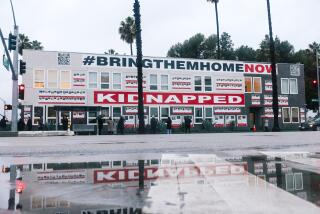Naming of Premier Derails Fiji Talks
- Share via
SUVA, Fiji — Just when a prolonged hostage crisis appeared close to resolution, Fiji’s new military leader threw negotiations into turmoil today by naming the husband of a woman being held by rebels as the head of an interim government.
The appointment of Ratu Epeli Nailatikau, who is also the son-in-law of the president forced from power this week, was seen as a slap in the face to rebel leader George Speight, who is holding much of the former government captive.
“We are going back to square one,” said a spokesman for Speight, Ratu Timoci Silatolu, speaking by telephone from the Parliament compound where about 30 hostages have been held since May 19. “What they have done just might push us to confrontation again.”
The hostage-takers released one captive today to attend a family member’s funeral. Silatolu said the release of Assistant Minister Adi Ema Tagicakibau was a “humanitarian measure” and not necessarily a precursor to a mass release of hostages.
The spokesman said Speight had rejected the appointment of the new prime minister by Commodore Frank Bainimarama, who announced a military takeover Monday to break the impasse between the hostage-takers and the government.
Speight, an advocate for the rights of indigenous Fijians, has no veto power over the appointment. But the move further complicated the tortured negotiations to release the hostages, who include ousted Prime Minister Mahendra Chaudhry and Nailatikau’s wife, former Tourism Minister Adi Koila Nailatikau. She is the daughter of President Ratu Sir Kamisese Mara, who ceded power to the military leader.
Negotiators have been meeting with Speight’s representatives since the military takeover and imposition of martial law. The political crisis is one of the most serious--and strangest--in the country’s recent history and could have devastating economic consequences for Fiji, a South Pacific nation heavily dependent on tourism.
The former British colony is located more than 3,000 miles southwest of Hawaii and consists of more than 300 islands, with some of the world’s most beautiful coral reefs and beaches.
Military negotiators have agreed to Speight’s main demands, which include full amnesty for Speight and his supporters, scrapping the country’s 1997 constitution that gave more rights to the nation’s ethnic Indian minority, and appointing an interim government that includes no members of the ousted regime.
The appointment of Nailatikau, a former army commander, meets the last of these conditions but does not appear to match the ultranationalist Speight’s intent. On Tuesday, he said he had no ambition of heading an interim government himself but wanted it dominated by those who support the rights of indigenous Fijians, who make up 51% of the nation’s population.
“I don’t think Speight is very happy about it, but he may have to accept it,” U.S. Ambassador Osman Siddique said. “A lot of things have gone his way. Maybe it’s time that some things didn’t go his way.”
Speight, a former businessman, has appeared to be basking in the attention he has received since seizing the hostages. He has logged vast amounts of time on news programs in Australia and New Zealand, where his attempted coup has been covered closely. He calls Australian news anchors by their first names.
Although the extent of his support throughout Fiji remains unclear, he has the strong backing of tribal chiefs in some regions. His followers have been bused in daily to the Parliament complex where the hostages are being held.
In a shady spot in front of the complex Tuesday, the voices of neatly dressed, middle-aged women rose in a heavenly concord of Methodist hymns. “Take Me, I Am Yours,” they sang, and “Let Your Will Be Done.” On a nearby field, men played rugby, using a used plastic soda bottle as a ball. A young girl in a long dress played hopscotch.
Unseen and unheard in the festivities were the hostages being held just yards away.
Many of those being brought to the Parliament are poorly educated villagers who seem to barely understand what is happening. “Why do you support George Speight?” one woman was asked. “I don’t know,” she said. “Did you think Prime Minister Chaudhry was doing a bad job?” “No,” she said. Told that he was being held hostage a few feet away, she smiled weakly and shrugged.
Others, more aware of the political background, point to Chaudhry’s efforts to make it easier for the country’s ethnic Indians, who make up 44% of the population, to lease or purchase land. Chaudhry was the first ethnic Indian prime minister, and his policies and abrasive behavior inflamed anti-Indian sentiment.
Several ethnic Indian cabdrivers were attacked by gangs of young men outside the Parliament complex Tuesday. “Get out, you filthy Indian!” one assailant shouted before a group roughed up and punched a driver. No serious injuries were reported.
More to Read
Sign up for Essential California
The most important California stories and recommendations in your inbox every morning.
You may occasionally receive promotional content from the Los Angeles Times.













